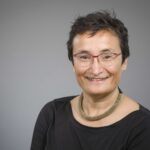Speakers

Dita Charanzová
European Parliament
About
Vice President of the European Parliament from the Czech Republic and Vice President of the ALDE Party. Elected first in 2014, she is now serving her second mandate within the liberal group Renew Europe. Ms Charanzová completed a doctorate degree from the University of Economics, Prague, and graduated from the Diplomatic Academy in Madrid. She is a former diplomat, whose postings included the Czech Permanent Representation to the EU during the Czech Presidency. She has also worked at the Council of Europe.
In the European Parliament Ms Charanzová is the Renew Europe spokesperson for the Internal Market and Consumer Protection Committee and a substitute member in the International Trade Committee. Ms Charanzová was named “MEP of the Year” in the field of Foreign Affairs in the 2016 MEP Awards. She was also among the 20 most influential women that are shaping Brussels politics in 2020, according to Politico.

Lucilla Sioli
European Commission
About
Director for “Artificial Intelligence and Digital Industry” within Directorate-General CONNECT at the European Commission. She is responsible for the coordination of the European digitisation of industry strategy and for policy development in the area of artificial intelligence (AI). The directorate also supports R&D&I in key digital industrial technologies including microelectronics, photonics, robotics and AI. Lucilla holds a PhD in economics from the University of Southampton (UK) and one from the Catholic University of Milan (Italy) and has been a civil servant with the European Commission since 1997.

Cécile Huet
European Commission
About
Cécile Huet is Deputy Head of the Unit “Robotics and Artificial Intelligence” at the European Commission. This unit funds and assists beneficial robotics and AI developments within Europe.
The unit is in charge of one of the world’s largest civilian programme in robotics with a budget of EUR700 million EU funding from Horizon 2020, supplemented by EUR2.1 billion from the European robotics industry in the context of the Robotics Public-Private Partnership.
The unit is coordinating the preparation of the AI activities in the next funding programmes, Horizon Europe and Digital Europe programmes. Currently the unit is working with the stakeholders on the next Partnership on AI, data and Robotics, defining the strategic research, development, innovation and deployment for Europe in these fields.
Moreover, this unit is at the heart of the Communication on Artificial Intelligence for Europe, the Coordinated Plan on Artificial Intelligence and the Communication on Building Trust in Human-Centric Artificial Intelligence.
Cécile joined the unit since its creation in 2004. Previously, she worked for the industry in signal processing after a post-doc at the University of California Santa Barbara and a PhD at University of Nice Sophia Antipolis.
In 2015, she has been selected as one of the “25 women in robotics you need to know about”.

Gabriele Mazzini
European Commission
About
Gabriele Mazzini has focused on legal and policy questions raised by new technologies since August 2017 and is currently working on a regulatory framework for artificial intelligence. As EU official, he also served in the European Parliament, Legal Service (2004-2009) and the Court of Justice (2001-2003). Between 2010 and 2017 Gabriele held several positions in the private sector in New York. He holds a LLM from Harvard Law School, a PhD in Italian and Comparative Criminal Law from the University of Pavia and a Law Degree from the Catholic University in Milan. He is qualified to practice law in Italy and New York.

Emanuela Girardi
POP Ai,
Italy
About
Emanuela Girardi is the founder of Pop AI (Popular Artificial Intelligence), Member of the High-Level Expert Group on AI of the Italian Minister of Economic Development (MiSE). Co-Lead of CLAIRE Taskforce on AI & COVID-19. Member of the Board of the Italian Association for Artificial Intelligence (AIxIA).

Holger Hoos
Leiden University, VISION Project Coordinator, the Netherlands
About
Holger H. Hoos is Professor of Machine Learning at Universiteit Leiden (the Netherlands) and Adjunct Professor of Computer Science at the University of British Columbia (Canada). He is a Fellow of the Association for Computing Machinery (ACM), Fellow of the Association for the Advancement of Artificial Intelligence (AAAI), Fellow of the European AI Association (EurAI), past president of the Canadian Association for Artificial Intelligence and one of the initiators as well as chair of the board of CLAIRE, an organisation that seeks to strengthen European excellence in AI research and innovation (claire-ai.org). He also leads the ICT-48 VISION coordination mandate for the newly created European networks of centres of excellence in AI. Holger is well known for his work across a broad range of topics in artificial intelligence, notably on the automated design of high-performance algorithms; he is one of the originators of the concept of automated machine learning (AutoML).

Kristian Kersting
TU Darmstadt,
Germany
About
Kristian Kersting is a Full Professor at the TU Darmstadt, Germany. He is the head of the AI and Machine Learning (AIML) lab, a member of the Centre for Cognitive Science, a faculty of the ELLIS Unit Darmstadt, and the founding co-director of the Hessian Center for Artificial Intelligence (hessian.ai).
After receiving his Ph.D. from the University of Freiburg in 2006, he was with the MIT, Fraunhofer IAIS, the University of Bonn, and the TU Dortmund University. His main research interests are statistical relational artificial intelligence (AI) as well as deep (probabilistic) programming and learning. Kristian has published over 180 peer-reviewed technical papers, co-authored a Morgan&Claypool book on Statistical Relational AI and co-edited a MIT Press book on Probabilistic Lifted Inference.
Kristian is a Fellow of the European Association for Artificial Intelligence (EurAI), a Fellow and Director of the European Laboratory for Learning and Intelligent Systems (ELLIS), and a key supporter of the Confederation of Laboratories for Artificial Intelligence in Europe (CLAIRE). He received the Inaugural German AI Award (Deutscher KI-Preis) 2019, several best paper and outstanding reviewer awards, a Fraunhofer Attract research grant, and the EurAI (formerly ECCAI) AI Dissertation Award 2006 for the best Ph.D. thesis in the field of Artificial Intelligence in Europe. Since 2020, Kristian is a columnist for the German newspaper Die Welt writing on AI.

Ieva Martinkenaite
Telenor Research,
Norway
About
Ieva is among the key figures at Telenor Group contributing to building AI research and innovation ecosystem in Norway. She leads a team of data scientists and Machine Learning engineers in Telenor and several high profile regional and national appointments in AI.
As Vice President of Telenor Research and Head of Analytics and AI team, Ieva is responsible for advancing research and driving research-based innovation in Telenor within data analytics, AI and IoT. Her work also involves advisory to Telenor executives and business leaders on digital technologies and innovation strategy. Concurrently, Ieva leads a joint AI task force of Europe’s largest telecommunication operator association ETNO and GSMA Europe.
She has more than 15 years of experience in product development, business research and advisory, and holds several Board membership positions. During 2018-2020 Ieva represented Telenor in the European Commission’s High-Level Expert Group on Artificial Intelligence that provided ethics guidelines for Trustworthy AI and recommendations on the implementation of European Strategy on AI.
Ieva holds a PhD in Strategic Management from BI Norwegian Business School.
Society focus

Anne Fleur van Veenstra
ModeratorTNO, the Netherlands
About
Director of Science responsible for the knowledge position of TNO’s unit Strategic Analysis and Policy. Senior researcher with over fifteen years’ experience in the fields Digital Government, Public Administration and Information Systems. Widely published on data – driven policy making, the societal impact of big and open data, emerging technologies such as artificial intelligence in public service delivery, and the impact of digitalization on organizations and governance. Set up TNO’s Policy Lab initiative, conducting experiments with data – driven policy making in collaboration with government organizations.

Virginia Dignum
Umeå University, Sweden
About
Professor of Responsible Artificial Intelligence at Umeå University, Sweden and associated with the TU Delft in the Netherlands. She is the director of WASP-HS, the Wallenberg Program on Humanities and Society for AI, Autonomous Systems and Software, the largest Swedish national research program on fundamental multidisciplinary research on the societal and human impact of AI. She is a member of the Royal Swedish Academy of Engineering Sciences, and a Fellow of the European Artificial Intelligence Association (EURAI). Her current research focus is on the specification, verification and monitoring of ethical and societal principles for intelligent autonomous systems. She is committed to policy and awareness efforts towards the responsible development and use of AI, as member of the European Commission High Level Expert Group on Artificial Intelligence, the working group on Responsible AI of the Global Partnership on AI (GPAI), the World Economic Forum’s Global Artificial Intelligence Council, lead for UNICEF’s guidance for AI and children, the Executive Committee of the IEEE Initiative on Ethically Aligned Design, and as founding member of ALLAI, the Dutch AI Alliance. Her book “Responsible Artificial Intelligence: developing and using AI in a responsible way” was published by Springer-Nature in 2019.

Nuria Oliver
ELLIS, Spain
About
Commissioner to the President of the Valencian Government on AI Strategy and Data Science against COVID-19; Cofounder and Vicepresident of ELLIS; Cofounder of the ELLIS Alicante Unit Foundation; Chief Data Scientist at Data-Pop Alliance;
PhD from MIT; Fellow of the IEEE, ACM Fellow and Fellow; Member of the Spanish Royal Academy of Engineering, SIGCHI Academy and Academia Europaea. 25+ years of research experience in human-centric AI. Author of 160+ widely cited scientific articles. Inventor of 40+ patents. Public speaker. Her work is regularly featured in the media and has received numerous recognitions, including the Spanish National Computer Science Award (Angela Ruiz Robles category), the MIT TR100 (today TR35) Young Innovator Award (first Spanish scientist to receive this award); 2019 Data Scientist of the Year in Europe; 2020 Data Scientist of the Year by ESRI. She has recently co-led ValenciaIA4COVID, the winning team of the 500k XPRIZE Pandemic Response Challenge.

Benoit Rottembourg
Inria, France
About
Benoit Rottembourg leads the Regalia project at Inria, the French National Institute for Research in Digital Science and Technology. Inria is a Research and Technology organization that gathers 3900 researchers and engineers and supports the diversity of innovation pathways: from open source software publishing to the creation of technological startups (Deeptech). The aim of Regalia is to provide to the regulation authorities a software framework for auditing digital platform algorithms.
Benoit joined Inria after 20 years of analytics software development (capacity planning, industrial asset management, dynamic pricing) in the industry. From 1998 to 2005, he lead the Data Science team of Bouygues, the French conglomerate, and from 2017 to 2020 he was head of customer and pricing data science at Maersk, the Danish maritime company. Benoit co-founded several technological start-ups in the energy and the retail sector.
Benoit holds a PhD in applied mathematics of Sorbonne-University. His research hybridizes AI with multi-stage stochastic discrete optimization.

Paolo Traverso
Fondazione Bruno Kessler (FBK), Italy
About
Paolo Traverso is the Director of Strategy and Business Development at Fondazione Bruno Kessler (FBK), a Research and Technology Organization (RTO) of more than 600 people working on AI, ICT, Sensors and Devices, Sustainable Energy, and Social Sciences. He joined FBK after working for companies in Milano, London and Chicago, and a period at the University of Edinburgh. From 2007 to the end of 2020, he was the Director of the Center for Information Technology at FBK. In 2017, he was appointed Chair of the Node Strategy Committee of the Italian Node of the European Institute of Innovation and Technology in ICT. He is the Coordinator of the ICT-49 European Project AIPlan4EU, and the leader for FBK in the AI NoEs VISION, TAILOR, and HumanE AI. He is a member of the Scientific Advisory Board of DFKI (Germany), and a member of the Management Committee of the Italian National Lab on AI. He is a Fellow of the European Association on Artificial Intelligence (since 2005).
Industry focus

Odessa Primus
ModeratorGlobal Arena Research Institute, Czech Republic
About
Odessa is the Executive Director of the Global Arena Research Institute, and its flagship annual event the Next 100 Symposium. She is also the main host of GARI’s podcast Last Week on Earth with the GARI. GARI combines the most advanced methods of AI-driven data, scientific and other artificial reasoning capabilities, elevating data science into completely new levels of opportunity. The goal is to provide unprecedented insights into the nature, impact, and management of globalization in order to improve institutional and governmental as well as business, energy and other sectors’ decision making. Our mission is to make the most of organically connecting AI-level reasoning capacities with the human-level critical reasoning capacities for the sake of a better future. GARI is currently developing a digital twin of the globalised world as a tool for leapfrog improvement of social science’s capacities to navigate through a fluid and ever-changing global landscape.

Giovanna Galasso
PwC IT Consulting Public Sector, Italy
About
Giovanna Galasso is a Director at PwC. She has a 20 – years track record in management and implementation of consultancy and research projects – both for national and for European Institutions – especially in the fields of design and evaluation of digital policies, technological innovation, digital transformation, Smart Cities, eGovernment and digitising industry. She has also a strong experience supporting the European Commission in capacity building and network creation projects. In the area of Digital Innovation Hubs, she led the “Smart Factories” project to set up a network of DIHs in new EU new Member States and
the “AI DIH Network” to set up the European network of DIHs in Artificial Intelligence.

Reinhard Lafrenz
euRobotics, Belgium
About
After studying Informatics with a focus on robotics and AI with a minor in Electrical Engineering at the University of Kaiserslautern, Reinhard Lafrenz worked at the University of Stuttgart, where he got a PhD in Cooperative Autonomous Mobile Robots and was strongly involved in RoboCup competitions.
In 2009, he moved to the Technical University of Munich, where he worked as a senior researcher, and gave lectures and seminars on AI and robotics, organised the interdisciplinary Master course “Robotics, Cognition, Intelligence” and participated in the curriculum development. He also worked as project manager for ECHORD, ECHORD++, projects focusing on technology transfer and SME support as well as RoboEarth, the first cloud robotics project. He took on several community activities, acted as co-leader of the newly created euRobotics topic group on “Software Engineering, System Integration, and System Engineering”.
Since Feb. 2016, he is the Secretary-General of euRobotics aisbl. euRobotics, which represented the private side of the SPARC public-private partnership under Horizon2020 and is involved in the process to form the partnership on AI, Data and Robotics under HorizonEurope. Besides association management and organisation of events such as the European Robotics Forum or the European Robotics Week, he’s also involved in the DIH related CSAs RODIN and DIHNET.EU.

Philipp Slusallek
DFKI, Germany
About
Philipp Slusallek is Executive Director DFKI Saarbrücken & Scientific Director of the research area on Agents and Simulated Reality. At Saarland University he has been a professor for Computer Graphics since 1999, a principle investigator at the German Excellence‐Cluster on “Multimodal Computing and Interaction” since 2007, and was Director for Research at the Intel Visual Computing Institute 2009‐2017. Before coming to Saarland University, he was a Visiting Assistant Professor at Stanford University. He is associate editor of Computer Graphics Forum, a fellow of Eurographics, a member of acatech (German National Academy of Science and Engineering), and a member of the European High‐Level Expert Group on Artificial Intelligence. In addition, Prof. Slusallek co‐founded the European initiative CLAIRE (Confederation of Laboratories for Artificial Intelligence Research in Europe) in 2018.
He originally studied physics in Frankfurt and Tuebingen (Diploma/M.Sc.) and got his PhD in Computer Science from Erlangen University. His research covers a wide range of topics including artificial intelligence, simulated/digital reality, real‐time realistic graphics, highperformance computing, motion synthesis, novel programming models for CPU/GPU/FPGA, computational science, and others.
Skills & Training Focus

Barry O’Sullivan
ModeratorUniversity College Cork, Ireland
About
Barry O’Sullivan is a Professor in the School of Computer Science & Information Technology at University College Cork in Ireland. He is founding director of the Insight Centre for Data Analytics at UCC and the Science Foundation Ireland Centre for Research Training in Artificial Intelligence. Professor O’Sullivan is a Fellow and Past President of the European AI Association and served as Vice Chair of the European Commission’s High-Level Expert Group on Artificial Intelligence. He currently serves on the Executive Council of the Association for the Advancement of Artificial Intelligence. He is an award-winning academic working in the fields of artificial intelligence, constraint programming, and operations research. He also works in AI and data ethics and works extensively on international policy-making and diplomacy activities related to AI. He is a Member of the Royal Irish Academy, Fellow of the Irish Academy of Engineering, and a Fellow of the Irish Computer Society.

Andreas Geiger
University of Tübingen, Germany
About
Professor of computer science heading the Autonomous Vision Group (AVG). His group is part of the University of Tübingen and the MPI for Intelligent Systems located in Tübingen, Germany at the heart of CyberValley. He is a deputy head of the department of computer science at the University of Tübingen, PI in the cluster of excellence ‘ML in Science’ and the CRC ‘Robust Vision’. He is also an ELLIS fellow, board member, and coordinator of the ELLIS PhD program. He is interested in 3D scene understanding, reconstruction, motion estimation, generative modeling and sensori-motor control in the context of autonomous systems. His goal is to make artificial intelligent systems such as self-driving cars or household robots more autonomous, efficient, robust and safe.

Fredrik Heintz
Linköping University, Sweden
About
Passionate about AI and helping society to take advantage of AI in an ethical and sustainable way. President SAIS, Director WASP Graduate school, member AI HLEG and IVA.
His research focus is artificial intelligence especially the combination of reseanoning and learning. He has extensive experience on applying AI techniques to robots and other autonomous systems.
Director of the Graduate School for the Wallenberg AI, Autonomous Systems and Software Program (WASP), the President of the Swedish AI Society, a member of the European Commission High-Level Expert Group on AI, and member of the Royal Swedish Academy of Engineering Sciences (IVA).
He is also very passionate about education and involved in many education activities both at the university level and in promoting AI, computer science and computational thinking in primary, secondary and professional education.

Ioannis Pitas
Aristotle University of Thessaloniki, Greece
About
Prof. Ioannis Pitas (IEEE fellow, IEEE Distinguished Lecturer, EURASIP fellow) received the Diploma and PhD degree in Electrical Engineering, both from the Aristotle University of Thessaloniki (AUTH), Greece. Since 1994, he has been a Professor at the Department of Informatics of AUTH and Director of the Artificial Intelligence and Information Analysis (AIIA) lab. He served as a Visiting Professor at several Universities.His current interests are in the areas of computer vision, machine learning, autonomous systems, intelligent digital media, image/video processing, human-centred computing, affective computing, 3D imaging and biomedical imaging. He has published over 920 papers, contributed in 45 books in his areas of interest and edited or (co-)authored another 11 books. He has also been member of the program committee of many scientific conferences and workshops. In the past he served as Associate Editor or co-Editor of 13 international journals and General or Technical Chair of 5 international conferences. He delivered 98 keynote/invited speeches worldwide. He co-organized 33 conferences and participated in technical committees of 291 conferences. He participated in 71 R&D projects, primarily funded by the European Union and is/was principal investigator in 43 such projects. Prof. Pitas lead the big European H2020 R&D project MULTIDRONE: https://multidrone.eu/. He is AUTH principal investigator in H2020 R&D projects Aerial Core and AI4Media. He was chair and initiator of the Autonomous Systems Initiative https://ieeeasi.signalprocessingsociety.org/. He is head of the EC funded AI doctoral school of Horizon2020 EU funded R&D project AI4Media (1 of the 4 in Europe). He has 32200+ citations to his work and h-index 85+ (Google Scholar).

Sara Polak
prg.ai, Czech Republic
About
Co-founder of Innovation Disrupt Startup and responsible for Communication at prg.ai. She is an Oxford University alumna, holding a BA in Archeology and Anthropology and a MSc. in Cognitive Evolutionary Anthropology. Sara has worked in startups in London and LA for 7 years and after almost 10 years abroad she returned back home to the Czech Republic to help centralize the innovative and technological environment and boost Czech Republic’s economy and society through multidisciplinary scalable adoption of cutting edge technologies.
PhD in exploring the evolution of music and the effect of Mozart’s compositions on human cognition.
